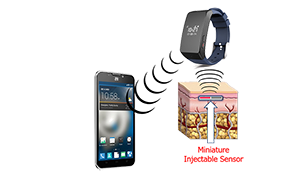GluSense said yesterday that it received a $2 million grant from the Juvenile Diabetes Research Foundation’s T1D fund for the company’s injectable glucose sensor.
said yesterday that it received a $2 million grant from the Juvenile Diabetes Research Foundation’s T1D fund for the company’s injectable glucose sensor.
Israel-based GluSense, part of Rainbow Medical, is developing the Glyde continuous glucose monitor for patients with Type I diabetes. The device is injected under the skin and lasts for 1 year, according to the company, sending continuous glucose measurements wirelessly to a wearable device.
“Today, diabetic patients need to endure frequent finger pricks daily in order to manage their glucose level, and even with modern CGMs, frequent calibrations, measurement verifications and replacements are still a hassle and limit efficient treatment,” GluSense CEO Boaz Brill said in prepared remarks. “In contrast, our Glyde continuous glucose monitor will provide accurate glucose measurement for a full year with significantly fewer blood glucose calibrations. This ground-breaking technology will simplify and improve the life of people living with T1D and insulin dependent T2D worldwide.”
“This collaboration is a significant recognition of the GluSense product and technology,” Rainbow Medical CEO Efi Cohen-Arazi added. “It will speed up our development process and ensure the technology meets the needs of patients and caregivers.”
GluSense plans to use the T1D Fund investment to bring the Glyde CGM closer to its 1st in-human clinical trial, the company reported.
The company’s implant uses a fluorescent glucose-sensitive biosensor, which is maintained with engineered live cells.
“The GluSense Glyde CGM is a highly innovative and promising technology,” T1D managing director Jonathan Behr said. “When paired with future advanced artificial pancreas systems or insulin injections, it will reduce the burden of T1D and help those living with the disease maintain blood glucose levels in a safe range.”
In January, the JDRF said that its T1D Fund made an unspecified equity investment in Bigfoot Biomedical and the Smartloop automated insulin delivery system it’s developing.
Bigfoot bills the Smartloop system as “the world’s first Internet-of-Things medical device system delivered as a monthly service,” designed to connect wearable insulin delivery and glucose monitoring systems controlled via smartphone.
